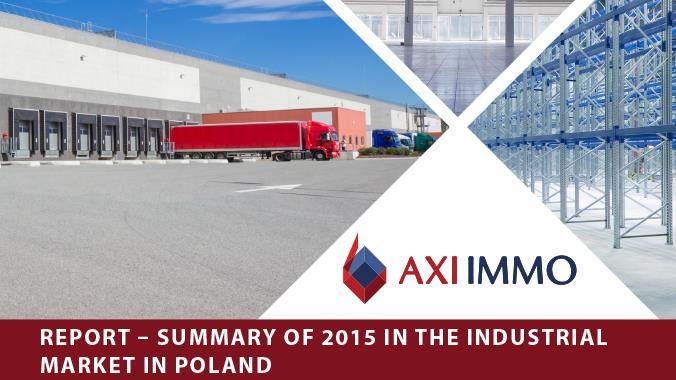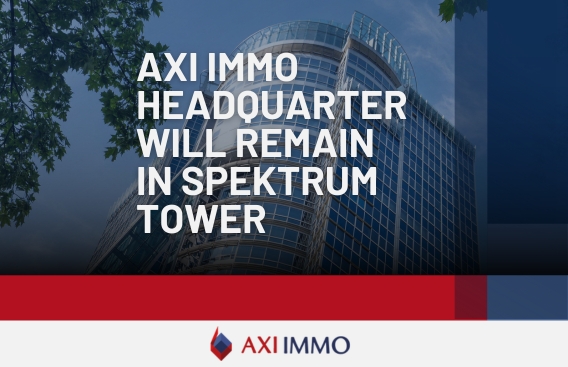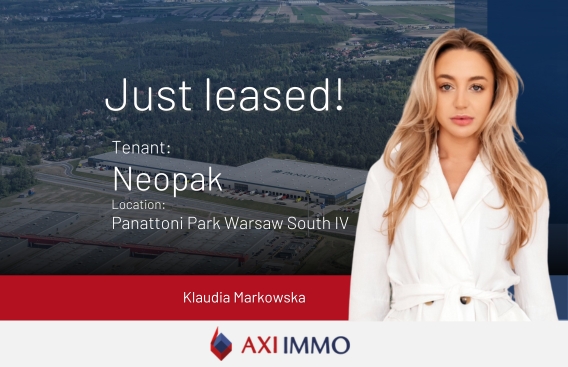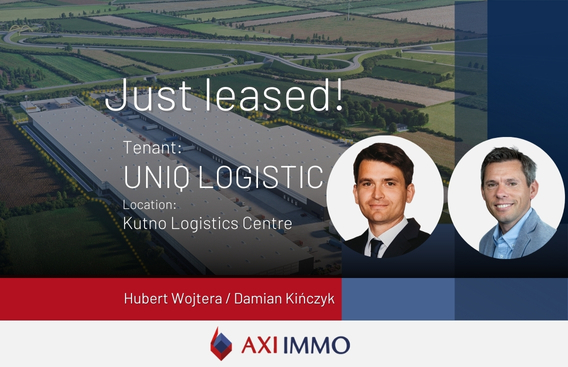Report: Report – Summary of 2015 in the industrial market in Poland
Very good results for demand and supply and the lowest vacancy rate in years coupled with stable rental rates are the image that emerged of the warehouse sector in 2015.

Very good results for demand and supply and the lowest vacancy rate in years coupled with stable rental rates are the image that emerged of the warehouse sector in 2015. The record volume of transactions in 2014 was beaten. Last year the total rented volume was 2.53 million sqm, of which over 60% were new leases. The high activity among tenants also translated into action by developers who delivered on the market 920,000 sqm. The result of the growth in demand is a low vacancy rate, which at the end of the year amounted to 4.8% and was 5 percentage points lower year to year. The high level of activity in the rental market is having a positive effect on the investment market, according to the report prepared by AXI IMMO. If you want to download full version of the report, click the following link below.
| Download: | Report: Warehouse market in Poland in 1015 | Download for free: PDF| 2 MB |
INVESTMENT MARKET
Good economic indicators, falling unemployment, investment opportunities associated with the new EU perspective and low-interest rates had a positive impact on investment activity in the commercial real estate sector. The total value of transactions in the investment market in 2015 exceeded 4.1 billion euros, of which the industrial sector accounted for nearly 470 million euros. The result in the warehouse sector was lower by 35% compared to 2014 due to the limited supply in the market. Large portfolio transactions took place in 2013-2014.
However, the high growth in the market, supported by high demand for space from tenants, means that warehouse projects are valued by investors. The Polish logistics sector is among the top 10 fastest-growing logistics markets in Europe [1]. This year, we can expect more sales of new projects delivered to the market. This sector has become an intrinsic element of the strategy of many investment funds. We are seeing high liquidity in the market, where value-added products with the potential to develop and increase their value are also being sold. The Polish warehouse market, due to its scale and scope of activity, will remain a key investment market for a growing number of institutional investors. Those actively working in the warehouse sector include Hillwood Europe, Deka Immobilien, Logicor, P3 and WP Carey. The yields in the warehouse sector compared to other sectors of commercial real estate remain the highest and are at a level of 7.0 to 7.5%.
This year, the sector will continue to develop based on e-commerce in foreign and Polish chains and new mix production and warehouse investments. From the tenant’s perspective, a key factor will be the availability of staff at those selected locations. On the supply side, we can expect new investments both in the main as well as new locations. The share of speculative projects in new supply will be maintained at the level of 30-40%. The stock will exceed 10 million square metres in the second half of the year, – comments Renata Osiecka, Managing Partner at AXI IMMO.
“In parallel with the lease, the market will increase investment market. We can expect new investors in the sector and the increased number of opportunistic purchases of industrial products, not only in major markets” – adds Renata Osiecka, Managing Partner AXI IMMO.
DEMAND
In the whole of 2015, 2.53 million square metres were leased, of which 60% were new lease agreements and expansions. This is a figure nearly 1 million sqm higher compared to 2014. Like the year before, the last quarter was the best, when more than 650,000 sqm of modern warehouse space was leased. The great results on the demand side are the result of good economic indicators, high growth in e-commerce, and increased production among companies present in Poland. The highest demand was recorded in the Warsaw region (660,000 sq m), then in Central Poland (540,000 sq m). The highest share of new lease agreements occurred in the Warsaw area. The largest transactions took place in central Poland. Besides the dominant warehouse regions in the country, it is worth noting the high demand in smaller regions and new locations such as Lublin, Rzeszów, and Bydgoszcz, which were a feature of the warehouse map of Poland in 2015. In these three regions, a total of 257,000 sq m were leased.
Among tenants, the dominant group are logistics companies with a 43% market share. The high share of logistics operators is due to the increased outsourcing of logistics services by manufacturing companies and the increase in the e-commerce sector. In second place were retailers, with an almost 15% share.
SUPPLY
From January to December 2015, developers delivered to the market more than 900,000 sq m of modern warehouse space. The largest share of new supply in the region took place in Poznan (239,000 sq m), with Upper Silesia in second place (117,000 sq m), followed by Wroclaw (108,000 sq m).
In 2015, developers developed projects in new locations outside the major regions, with nearly 190,000 sq m being completed in Szczecin, Lublin, and Rzeszów. The highest share, 70%, in new supply was taken by Panattoni Europe, followed by Goodman and SEGRO.
Speculative construction has fully returned to the warehouse market in Poland. At the end of the year, 840,000 sq m were under construction, of which more than 270,000 sq m constituted speculative investment. At the end of the year, most of the projects in progress were in the Warsaw area (218,000 sq m), followed by Upper Silesia (174,000 sq m) and Wroclaw (166,000 sq m). A total of approx. 35% of the completed space was a speculative investment; this is an increase of 10% compared with the end of 2014.
VACANCY RATE
At the end of December, the vacancy rate was at a record low of 4.8%. This is the result of being about 5 percentage points lower than a year earlier. In most regions, there is a lack of large units available immediately. The smallest amount of available space is currently in Lodz, with most remaining in the vicinity of Warsaw and Tri-City. In the coming months, as a result of the completion of new investments, the vacancy rate should rise, but given stable demand, it will not be a significant jump. In subsequent quarters, the average vacancy rate will remain below 10%. A characteristic feature of the market is that logistics companies and networks are moving to new buildings, which is freeing up space in older parks. On the other hand, some space is rented in the short term, with the possibility of immediate termination at the time of signing the contract.
RENTS
The falling vacancy rate has not resulted in an increase in rents. To obtain the largest contracts, developers competed sharply on price. As a result, in most regions, average rents remained stable, and in some locations, such as Upper Silesia, Poznan, and the Warsaw area, they even showed a downward trend. Prices in Lodz remain quite high without declining, which is due to low vacancy rates and also the lack of speculative investments. Widening gaps between the amount asked and effective rents can be observed. To get important tenants, developers can offer a wide range of exemptions from rent; however, asking base rents are subject only to small negotiations. Average effective rates in the major markets fluctuated in the range: of 2.0 – 2.5 EUR/sqm in Central Poland and the Warsaw area, 1.9 – 2.6 EUR/sqm in Upper Silesia, and over EUR 2.5/sqm in Krakow, Rzeszow and Lublin.
FORECAST
A high level of activity from tenants and expanded development activity in the main markets, as well as in new locations will be stable in 2016. Among the main markets, the biggest number of new projects we can expect is in Poznan and Warsaw region. The main factor determining the growth in demand and supply in the sector will depend on internal macroeconomic data associated with the investments of companies, an increase in export and domestic consumption. Additional risks are external factors like a social and economic situation in UE and a slowdown in the Chinese economy.
It is worth noting that an important factor, especially for tenants is the availability of staff. A low level of unemployment below 10%, and in warehouse locations even in the vicinity of 2-3%, is an important indicator influencing the investment decisions of companies. Difficult challenges are facing the market regarding new projects in new well-communicated and still attractive locations, but with greater access to basic stuff. Therefore, the development of projects in new regions, but also discovering new locations in major logistics hubs, will be a natural process in the market.
Another issue will be the availability and the possibility of purchasing land for development in the face of the new law on land sales. Last year, purchases of land for industrial projects rose by at least 40% compared to the previous year. This year, it will be difficult to maintain such good results. Average prices for quality plots in logistic locations are between 70 to 150 PLN for sqm, except for the plots in Warsaw Inner City and Cracow region.
More information about the regional warehouse market is in the full version of the report.
Author: Renata Osiecka
Recent articles

16 May 2024
AXI IMMO headquarter will remain in Spektrum Tower, Warsaw
AXI IMMO headquarter will remain in Spektrum Tower office building in the city centre of Warsaw, Poland.

13 May 2024
Neopak with new distribution centre in Nadarzyn near Warsaw
Neopak with a new distribution centre in Nadarzyn, advises AXI IMMO

15 April 2024
UNIQ LOGISTIC stays in Kutno, AXI IMMO real estate agency advises
UNIQ LOGISTIC stays in Kutno, central Poland, in the Kutno Logistics Centre. The tenant was advised by AXI IMMO

27 March 2024
MR D.I.Y. advised by AXI IMMO rents a warehouse at Hillwood Zgierz I, Central Poland
Almost 5,000 sq m for the logistics headquarters of MR D.I.Y. in Central Poland